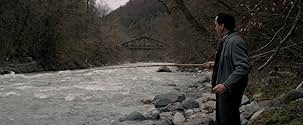AVALIAÇÃO DA IMDb
6,4/10
2,1 mil
SUA AVALIAÇÃO
A história de Django Reinhardt, famoso guitarrista e compositor, e sua fuga da Paris ocupada pelos alemães em 1943.A história de Django Reinhardt, famoso guitarrista e compositor, e sua fuga da Paris ocupada pelos alemães em 1943.A história de Django Reinhardt, famoso guitarrista e compositor, e sua fuga da Paris ocupada pelos alemães em 1943.
- Direção
- Roteiristas
- Artistas
- Prêmios
- 5 indicações no total
Cécile de France
- Louise de Klerk
- (as Cécile De France)
Bea Palya
- Naguine Reinhardt
- (as Beata Palya)
Gabriel Mirété
- Lévêque
- (as Gabriel Mireté)
- …
Etienne Timbo Mehrstein
- Timbo Hoffman
- (as Etienne Mehrstein)
Avaliações em destaque
A splendid gripping film, released on the day we Dutch honor all those who have fallen during the 2nd World War. The captivating acting and the way in which the film was shot, immerses you in and meanders you along a distressing part of Django Reinhardt's life. The spellbinding music in the film, paying homage to Django Reinhardt's innovative jazz with an infusing Gypsy flavor, will stay with you for the rest of your life. And if you ever have the good fortune to visit the chapel of Saint-Pierre in Villefrance-sur- Mer (France) and look at the details of the wall paintings by Jean Cocteau, you will realize what a big impact Django has made on lots of people.
I found the DVD of this movie at my public library and watched it at home. A curious DVD presentation in that it has no menu, it just starts and runs for almost 2 hours, mostly French and German with English subtitles.
I am a musician but only became familiar with Django Reinhardt in the Woody Allen movie "Sweet and Low Down" which featured a fictional character, a guitarist, who would almost faint at the thought of even meeting Reinhardt, his idol. So this movie is a good look at who the guitarist really was.
Reda Kateb, a Belgian actor, is very good as Django Reinhardt. Even though he had been playing for quite a while the story here picks up in 1943 France during the German occupation. Django had a double whammy against him, being a Gypsy and being a Jazz musician, two things the Nazis were against and killed many for. But he managed to survive because of his musicianship.
Good movie of an interesting musician in a difficult time. he didn't live much longer, dying at age 43.
I am a musician but only became familiar with Django Reinhardt in the Woody Allen movie "Sweet and Low Down" which featured a fictional character, a guitarist, who would almost faint at the thought of even meeting Reinhardt, his idol. So this movie is a good look at who the guitarist really was.
Reda Kateb, a Belgian actor, is very good as Django Reinhardt. Even though he had been playing for quite a while the story here picks up in 1943 France during the German occupation. Django had a double whammy against him, being a Gypsy and being a Jazz musician, two things the Nazis were against and killed many for. But he managed to survive because of his musicianship.
Good movie of an interesting musician in a difficult time. he didn't live much longer, dying at age 43.
Greetings again from the darkness. Don't mistake this for either the Franco Nero (1966) or Jamie Foxx (2012) movie. This latest from writer/director Etienne Comar centers on Django Reinhardt, one of the most talented and influential musicians of the twentieth century. Based on the novel "Folles de Django" by Alexis Salatko, the story follows the challenges of his escape from German-occupied France.
He is already a renowned (and enigmatic) performer when the film kicks off in 1943 Ardennes, as Django and his band are being contracted by the Nazis to tour and entertain the troops. Of course, he refuses to sign the contract and tour under their terms with limit the style of music he can play. Because of this, Django and his family must flee and disappear underground, while they plan an escape to Switzerland.
His musical influence proliferated the area, and his influence and respect is clear at each step of his travels. In fact, it's the musical pieces and segments that really stand out here. Reda Kateb (A PROPHET, 2009) gives a terrific and expressive performance as Django, but the musical portions are so outstanding, that we find ourselves not as engaged in the personal saga of escape as we should. Clearly, the war and Nazis are a threat, and when Django says "I'm a musician. It's what I do", that serves as his admission that he takes an apolitical stance and does not envision himself as a hero to the people.
As a driving force behind European jazz, and being such an influence on so many guitar players, Django's legacy is something other than as a war icon. The film certainly could have benefitted from more attention to either how his music gained popularity, or what drove him to avoid any political notoriety until it was too late for many of his fellow Gypsies. Admittedly, his escape was crucial and led to his 1945 score, "Requiem for Gypsy Brothers", of which his conducting leads to the most emotional moment of the film.
He is already a renowned (and enigmatic) performer when the film kicks off in 1943 Ardennes, as Django and his band are being contracted by the Nazis to tour and entertain the troops. Of course, he refuses to sign the contract and tour under their terms with limit the style of music he can play. Because of this, Django and his family must flee and disappear underground, while they plan an escape to Switzerland.
His musical influence proliferated the area, and his influence and respect is clear at each step of his travels. In fact, it's the musical pieces and segments that really stand out here. Reda Kateb (A PROPHET, 2009) gives a terrific and expressive performance as Django, but the musical portions are so outstanding, that we find ourselves not as engaged in the personal saga of escape as we should. Clearly, the war and Nazis are a threat, and when Django says "I'm a musician. It's what I do", that serves as his admission that he takes an apolitical stance and does not envision himself as a hero to the people.
As a driving force behind European jazz, and being such an influence on so many guitar players, Django's legacy is something other than as a war icon. The film certainly could have benefitted from more attention to either how his music gained popularity, or what drove him to avoid any political notoriety until it was too late for many of his fellow Gypsies. Admittedly, his escape was crucial and led to his 1945 score, "Requiem for Gypsy Brothers", of which his conducting leads to the most emotional moment of the film.
Solid biopic of a short period of Django's life during WWII. Acting OK, photography is very good, plot is OK but the music and the onscreen playing thereof is masterful.
This film covers mostly 1943 as well as a bit in May, 1945 at the end. So, obviously this film is not Django Reinhardt's entire life story. It's a shame but I can certainly understand why they chose this path. If you want to know more about the man, check Wikipedia and go from there.
The film picks up in the middle of WWII. Django is a big star in Paris and is even loved by the occupying Nazis. What makes this so unusual is that he was one of the Romani (aka Gypseys) and they were hated and persecuted by the Reich. Additionally, he played swing...a style music associated with black Americans...a group also despised by the German government. Problems develop when the Nazis insist he do a tour of Germany and Django is worried he'll never return. So, they decide to make a run for it. The movie is all about this period of time.
The film is something I really appreciated because tons of films have been done about the Jewish Holocaust. These are excellent films but the Romani were also gassed in large numbers and I can't think of a single film that covers it other than this one. It makes for a sad viewing experience...but also a masterfully crafted one well worth your time.
The film picks up in the middle of WWII. Django is a big star in Paris and is even loved by the occupying Nazis. What makes this so unusual is that he was one of the Romani (aka Gypseys) and they were hated and persecuted by the Reich. Additionally, he played swing...a style music associated with black Americans...a group also despised by the German government. Problems develop when the Nazis insist he do a tour of Germany and Django is worried he'll never return. So, they decide to make a run for it. The movie is all about this period of time.
The film is something I really appreciated because tons of films have been done about the Jewish Holocaust. These are excellent films but the Romani were also gassed in large numbers and I can't think of a single film that covers it other than this one. It makes for a sad viewing experience...but also a masterfully crafted one well worth your time.
Você sabia?
- CuriosidadesAll music played by the incredible Dutch Rosenberg Trio
- ConexõesFeatures Hoch der Lambeth Valk (1941)
- Trilhas sonorasNuages
Music by Django Reinhardt
Principais escolhas
Faça login para avaliar e ver a lista de recomendações personalizadas
- How long is Django?Fornecido pela Alexa
Detalhes
Bilheteria
- Orçamento
- € 8.804.249 (estimativa)
- Faturamento bruto nos EUA e Canadá
- US$ 56.556
- Fim de semana de estreia nos EUA e Canadá
- US$ 11.722
- 7 de jan. de 2018
- Faturamento bruto mundial
- US$ 3.876.874
- Tempo de duração1 hora 57 minutos
- Cor
- Proporção
- 2.35 : 1
Contribua para esta página
Sugerir uma alteração ou adicionar conteúdo ausente


![Assistir a Bande-annonce [OV]](https://m.media-amazon.com/images/M/MV5BMDc0Zjk3YzgtYTBmZC00MDI5LTg1MjItZjBjMGEyMzI3ODc2XkEyXkFqcGdeQXRodW1ibmFpbC1pbml0aWFsaXplcg@@._V1_QL75_UX500_CR0)
























